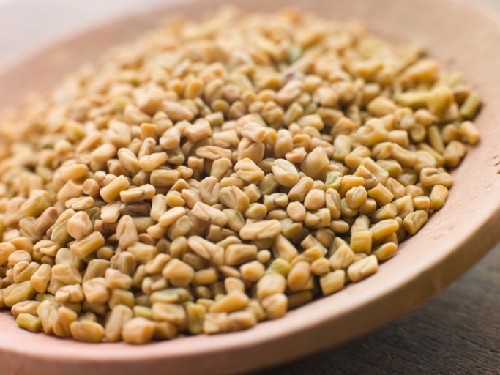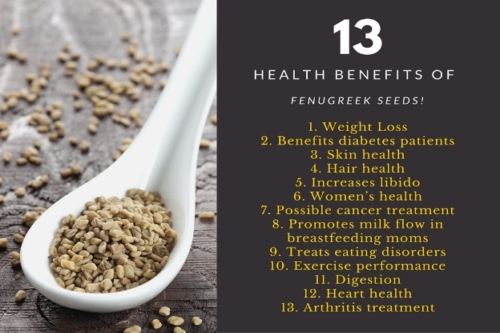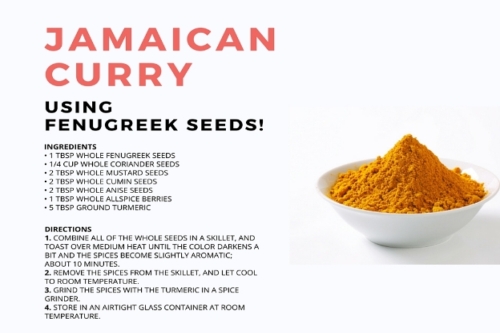 Indian or Ayurvedic food is nothing without its aromatic and medicinal spices.
Indian or Ayurvedic food is nothing without its aromatic and medicinal spices.
The most popular spices are cumin seeds, fennel seeds and of course there’s turmeric.
But fenugreek seeds may be one you don’t know yet. It’s an incredibly flavorful spice, and the benefits of fenugreek seeds are seemingly endless.
Fenugreek is considered one of the oldest medicinal plants, and is grown throughout India, the Mediterranean, Egypt, the Middle East, Argentina, and North Africa.
The use of fenugreek was first recorded on ancient Egyptian papyrus around the date of 1500 BCE.
The fenugreek plant is an annual herb that grows two to three feet tall, its leaves are used in cooking, and the pods carry about 20 small yellow-brown, flat, aromatic, and pungent seeds. Fenugreek has been used in many cultures, and therefore has multiple names including methi, methika, Greek clover, trigonelle, woo lu bar, hu lu ba, Greek hay, bockshornklee, bockshornsame, and bird’s foot.
A Nutritional Analysis of Fenugreek Seeds
What is it about fenugreek seeds that make them so nutritious (1)? Fenugreek seeds are known for their iron content; they contain 20% of your daily value in just one tablespoon. The seeds also contain protein, fiber, manganese, copper, magnesium, phosphorus, vitamin B6, potassium, folate, calcium, and zinc, and trace amounts of vitamin A, vitamin B1, vitamin B2, vitamin B3, vitamin C, sodium, and selenium.
The following is a comprehensive chart for a tablespoon’s worth; that’s about all you need for your dishes:
Fenugreek Seeds Nutrition Chart (1 tbsp)
| Nutrient | Amount | Daily Value |
| Calories | 35.5 | 2% |
| Carbohydrates | 6.4 g | 2% |
| Fiber | 2.7 g | 11% |
| Total Fat | 0.7 g | 1% |
| Protein | 2.5 g | 5% |
| Vitamin A | 6.6 IU | N/A |
| Vitamin C | 0.3 mg | 1% |
| Vitamin B3 | 0.2 mg | 1% |
| Vitamin B6 | 0.1 mg | 3% |
| Folate | 6.3 mcg | 2% |
| Calcium | 19.4 mg | 2% |
| Iron | 3.7 mg | 20% |
| Magnesium | 21 mg | 5% |
| Phosphorus | 32.6 mg | 3% |
| Potassium | 84.7 mg | 2% |
| Zinc | 0.3 mg | 2% |
| Copper | 0.1 mg | 6% |
| Manganese | 0.1 mg | 7% |
| Selenium | 0.7 mcg | 1% |
| Phytosterols | 15.4 mg | N/A |

What Are the Benefits of Fenugreek Seeds?
Although more research is needed to confirm the potential benefits, there is plenty to like about these seeds from a health perspective. Like most aromatic and Indian herbs, fenugreek is great for inflammation. Fenugreek seed extract and oil are both loaded with helpful properties (2) (e.g., antioxidant, antimicrobial, anti-diabetic, to name a few). Here are some of those benefits in a little more detail:
1. Weight loss
What are the benefits of fenugreek seeds for weight loss? The fiber contained within fenugreek seeds can help you suppress appetite, which in turn aids with weight loss. Try chewing on fenugreek seeds each morning on an empty stomach.
2. May benefit diabetes patients
Fenugreek seeds can benefit diabetes patients due to a natural soluble fiber called galactomannan, which helps slow the rate of sugar absorption into the blood. A study published in the Indian Journal of Biochemistry & Biophysics in 2010 found that fenugreek seeds are not only useful in controlling blood sugar levels in diabetic rats, but that they also protect against kidney and heart damage caused by diabetes-induced oxidative stress.
3. Skin health
The antioxidant and anti-inflammatory properties in fenugreek seeds are also important for skin health. Fenugreek seed benefits for skin include treatments for boils, scars, burns, acne, eczema, wounds, leg ulcers, and local skin inflammation. The anti-inflammatory activity of fenugreek seeds is due to steroids and glycoside derivatives.
4. Hair health
There are also fenugreek seed benefits for hair. You can make a great paste out of them for hair health. Simply massage your head with boiled fenugreek seeds that have been soaked overnight in coconut oil. It’s a great remedy for hair loss or hair thinning, and it’s also used for skin-related hair problems like dandruff.
5. Increases libido
Fenugreek seed benefits for men include treatments for hernias and male pattern baldness, and especially for erectile dysfunction. Fenugreek can increase testosterone levels and sexual arousal, and fenugreek supplements have been proven to increase sexual performance and sexual desire. In a study published in the journal Phytotherapy Research in 2011 (3), researchers found that fenugreek extract significantly influenced energy, stamina, and sexual arousal in 60 men between the ages of 25 and 52, and also helped them maintain normal testosterone levels. In this study, men with a history of erectile dysfunction were given either a placebo or 600 milligrams of fenugreek extract daily for a six-week period. All participants reported a positive effect on libido after taking fenugreek.
6. Women’s health
Fenugreek also contains compounds with estrogen-like properties, including isoflavones and diosgenin, which help decrease the cramps and discomfort associated with premenstrual syndrome. These compounds also help ease the symptoms of menopause, such as mood fluctuations and hot flashes. Fenugreek is also thought to help induce childbirth through the stimulation of uterine contractions, and can reduce labor pain, but excess fenugreek may result in premature birth or miscarriage during pregnancy.
7. Possible treatment and prevention of cancer
Fenugreek is also useful in the treatment and prevention of cancer. The fiber in fenugreek is thought to bind to the toxins in food and flush them out of the body, which can help protect the colon from cancer. Research on rats published in the journal Cell Biology International in 2005 (4) suggests that fenugreek seeds have significant chemopreventive effect against breast cancer.
8. Promotes milk flow in breastfeeding mothers
Fenugreek is considered important for nursing mothers due to the presence of diosgenin, which is thought to increase milk production. Several studies show that fenugreek promotes milk flow, and one study published in the journal BMC Complementary & Alternative Medicine in 2013 (5) shows that some breastfeeding mothers do use it. In the study, 304 participants who had used at least one herb for medicinal purposes during breastfeeding completed a questionnaire; fenugreek was the most common herb used amongst the participants.
9. May Help treat eating disorders
The restorative and nutritive properties found in fenugreek can help increase appetite. In a study published in the journal Pharmacology Biochemistry, and Behavior in 1993 (6), researchers found that fenugreek extract significantly increased the motivation to eat in rats. That said, the researchers also noted that fenugreek did not prevent drug-induced anorexia.
10. Exercise performance
A study published in the Journal of Sports Science & Medicine in 2011 (7) reported that the combination of fenugreek extract and creatine supplementation impacted body composition and upper body strength as effectively as a creatine and dextrose combination. The study included 47 resistance-trained men who were given either five grams of creatine and 70 grams of dextrose, or 3.5 grams of creatine, 70 grams of dextrose, and 900 milligrams of fenugreek extract. The participants completed resistance-training program for an eight-week period. The fenugreek-and-creatine group showed increases in lean mass, and leg press and bench press strength. Fenugreek combines well with creatine to eliminate the need for high amounts of carbs when training.
11. Digestion
Fenugreek is thought to help with numerous types of digestive problems, including inflammation of the stomach, upset stomach, constipation, indigestion, and heartburn. Fenugreek is often used in combination with other herbal remedies in the treatment of inflammatory bowel disease and ulcerative colitis (8). Fenugreek is used along with devil’s claw, slippery elm, and Mexican yam.
12. May treat high cholesterol and heart disease
Fenugreek plays a key part in heart health due to the presence of galactomannan. The high amount of potassium in fenugreek also helps control blood pressure and heart rate. In a study published in the journal Prostaglandins, Leukotrienes, and Essential Fatty Acids in 1997 (9) found that fenugreek significantly lowered cholesterol and triglycerides without affecting HDL (“good”) cholesterol.
13. Arthritis treatment
A study published in the journal International Immunopharmacology in 2012 (10) sought to examine the antioxidant and anti-inflammatory effects of fenugreek mucilage on arthritic rats. The results were positive; leading the research team to believe that fenugreek may be effective to help treat arthritis.

Fenugreek Seed Recipes
Fenugreek is often found in Indian spice blends, including curry dishes. Fenugreek leaves are also used in salads, and fenugreek seeds are a common flavoring agent in imitation products such as tobacco, beverages, syrup, and other foods. The following are a couple of fenugreek seed recipes you can incorporate in your diet:
Jamaican Curry Powder
Ingredients
- 1/4 cup whole coriander seeds
- 1 tbsp whole fenugreek seeds
- 2 tbsp whole mustard seeds
- 2 tbsp whole cumin seeds
- 2 tbsp whole anise seeds
- 1 tbsp whole allspice berries
- 5 tbsp ground turmeric
Instructions
- Combine all of the whole seeds in a skillet, and toast over medium heat until the color darkens a bit and the spices become slightly aromatic; about 10 minutes.
- Remove the spices from the skillet, and let cool to room temperature.
- Grind the spices with the turmeric in a spice grinder.
- Store in an airtight glass container at room temperature.
Bean Curry
Ingredients
- 2 cans black-eyed beans (or 225 g of dried beans, soaked overnight and cooked)
- 1/4 tsp fenugreek seeds
- 1 tbsp coriander seeds
- 2 tbsp coriander leaves
- 1 tbsp cumin seeds
- 1 tsp fennel seeds
- 1/2 inch cinnamon stick
- 1/2–2 tsp crushed chili flakes
- 4 tbsp peanut oil
- 1 tsp black mustard seeds
- 10 fresh curry leaves
- 2 garlic cloves, peeled and crushed
- 1 onion, medium, finely chopped
- 2-inch piece fresh ginger, grated
- 2 1/3 cups water
- Salt, to taste
- 2 tbsp fresh coconut, grated (optional)
Instructions
- Drain and rinse the beans, and mash with a fork.
- Combine coriander, cumin, fennel, and fenugreek seeds with the cinnamon stick into a small frying pan, and roast on medium heat until the spices change color and become aromatic.
- Grind the roasted spices into a spice grinder, and add the chili flakes.
- Heat the peanut oil over medium heat, and add the curry leaves and mustard seeds. Remove from heat covered, and let the leaves and seeds cook and pop.
- Put back on heat, and add onion. Cook until lightly golden brown, and add the garlic and ginger, and cook for about 30 seconds.
- Add the beans, roasted spice mixture, salt, and bring to a boil. Once boiled, turn to low, cover, and simmer for about 20 minutes.
- Top with coriander leaves and fresh coconut, and serve on brown rice or quinoa.
Possible Side Effects of Fenugreek Seeds
While there are several fenugreek seed benefits, there are unfortunately also some side effects to keep in mind. For instance, although fenugreek is used to induce childbirth, women should still talk to their doctor before using it. Here are some other side effects associated with fenugreek:
- May cause diarrhea, bloating, and gas when taken orally
- Irritation when applied directly to the skin
- May cause excessive bleeding in some people; those with bleeding disorders or who take anticoagulants or blood thinners shouldn’t take fenugreek without a doctor’s approval
Read Next:
